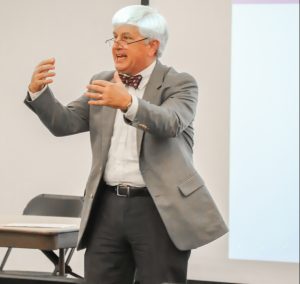A mock trial that focused on negligence and malpractice in healthcare was held on Oct. 1. The event kicked off Interprofessional Education Week at the University of Indianapolis, which consisted of a series of lectures. The trial was organized by Associate Director for the School of Nursing Kathleen Hetzler with the help of Assistant Professor of Social Work Wanda Watts.
Interprofessional Education Week is organized by people from the College of Health Sciences, the School of Nursing and the College of Applied Behavioral Sciences so that students can participate in extracurricular activities while learning about trending topics in health care fields, according to Watts.
Marion County Judge Mark Renner explained that negligence and malpractice are not the same thing, though they are similar. Negligence is the failure to take proper care in doing something, while malpractice is improper or illegal professional activity or treatment.
In a mock trial on Oct. 1, Marion County Judge Mark Renner explained the five requirements of negligence in healthcare that courts use to determine whether a doctor used incorrect care when treating his/her patient.
Renner and Attorney were representatives for the trial. According to Renner, this is not his first time at UIndy. He has been known to volunteered to do lectures and mock trials on campus.
“I’m always going to volunteer,” Renner said. “Because I have this body of knowledge that I hope is something that is beneficial to this student population.”
For the mock trial, the audience would play the role of the jury and making the verdict at the end of the stimulation. The video consisted of an actual negligence trial between the characters patient Deb Beck and Doctor West. The video was shown in order to give the audience the background information to make a verdict on.
In the mock trial, West was put on trial for the malpractice of taking Beck off a pill without explaining the possible risks without it, the act that then resulted in the death of Beck. However, she did disclose that if Beck had started to feel sick at any point that she should go to the emergency room. When Beck started to show flu like symptoms she instead scheduled an appointment with West instead of going straight to the emergency room like suggested.
After finishing the video, Renner lectured about different laws in Indiana that protected professionals in the health care systems. He also went on to discusses other methods that are put in place to help keep health professionals on track such as standard of care, scope of standard and documentation. Senior nursing major Kacie Johnson said she felt shocked as she was listening to all of the laws that healthcare professionals had to protect themselves.
“I didn’t understand how different Indiana’s laws were from other states,” Johnson said. “So I thought that was kind of shocking in a nice way.”
At the conclusion of Renner’s lecture, Stoelting began her lecture which focused more on the insurance aspect of health care professionals and how much their insurance could pay in case a lawsuit was filed.
She also showed the growth of insurance covers from the early 1970s to the present by using different bar graphs along with statistics.
Finishing up the mock trial, the audience was able to take a moment to deliberate their verdict before voting on the guilt of West. The ending verdict from the audience was not guilty and that West followed her standard of care and should not be responsible for the death of Beck.
Renner said his goal was to educate the students and leave them with an understanding of the concept of a negligence case in the civil law and for them to be able to draw a distinction between medical malpractice and negligence.
“I want to get across to them this whole idea that negligence isn’t this amorphous term,” Renner said. “It has real world connections to all of us.”







